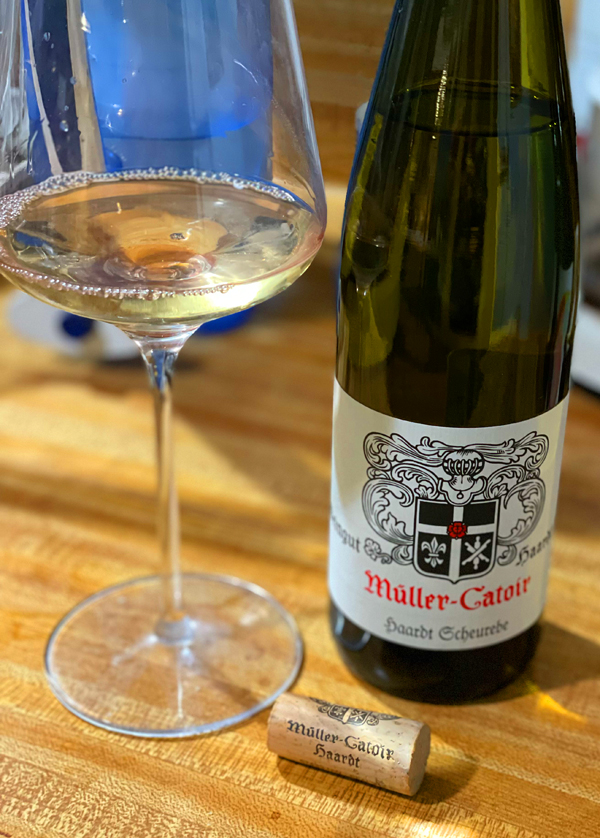2017 Mueller-Catoir, Scheurebe Trocken, Haardt, Pfalz, Germany.
The nose on Mueller-Catoir’s Haardt Scheurebe Trocken is exotic with lime blossom and jasmine, but not as perfumey as Muscat and the palate has a lush tropical medium body that has a nice crisp play between fruit and edgy bitter elements with some white peach and pineapple fruits accented with spearmint, zesty grapefruit and mineral spice. Shuerebe is a rare varietal, mostly found in Germany, though some exists in Austria as well, its’s a very aromatic grape, also known as Samling 88 (Austria), that was created from a seed crossing of Riesling and a little known varietal called Bukettrbe back in 1916 by Doctor Georg Sheu, hence the name, which became official as tribute to its creator. I should state my thanks for these newly researched details by Anne Krebiehl MW, who presented these now known facts in her book “The Wines of Germany” also as she notes, that for many years, it was thought Scheurebe was a crossing of Riesling and Silvaner, but more conclusive studies has proved otherwise. Scheurebe, it is said, grows best in Calcareous soils, with Muller-Catoir’s Pfalz version regarded as maybe the greatest expression of this grape, coming from mainly the sandstone soils here.
Mueller-Catoir’s Scheurebe Haardt Trocken is sourced from multiple plots in Haardt vineyard area that are composed of some primary rock (urgestein) and the mentioned sandstone, with proportion of gravel located lower on the slopes here. This famous estate and the region has a long history of winegrowing with the Burgergarten site being first planted close to 700 years ago, and, as the winery notes, and while there has been some ups and downs, it remains one of the best wineries in Germany. Mueller-Catoir which has a tradition of reductive winemaking implementing a gentle crush, a long skin contact, slow gentle pressing, and then ferments at warmer, according to the winery again, than customary fermentation temperatures in stainless steel to promote transparency, with this 2017 dry Scheurebe being full of energy and with a touch of fresh tartness, making it compelling and food friendly. Mueller-Catoir makes an exceptional st of Rieslings from lightly sweet to powerful dry GGs and I highly recommend exploring their awesome range of whites, especially those Rieslings, but don’t overlook the Scheurebe, Muskateller, Grauburgunder and Rieslaner, a grape not related to Riesling and one that makes a sublime sweet wine, you can’t go wrong with any of these and I am looking forward to grabbing some of the highly acclaimed 2020s.
($26 Est.) 91 Points, grapelive
